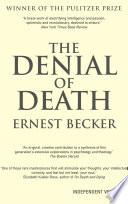Quotes from book
The Denial of Death

The Denial of Death is a 1973 work of psychology and philosophy by the cultural anthropologist Ernest Becker, in which the author builds on the works of Søren Kierkegaard, Sigmund Freud, Norman O. Brown and Otto Rank. It was awarded the Pulitzer Prize for General Non-Fiction in 1974, two months after the author's death.

“All religions fall far short of their own ideals.”
Source: The Denial of Death (1973), The Present Outcome of Psychoanalysis, p. 204

They push themselves to maximize this feeling. As philosophers have long noted, it is as though the heart of nature is pulsating in its own joyful self-expansion. When we get to the level of man, of course, this process acquires its greatest interest. It is most intense in man and in him relatively undetermined—he can pulsate and expand both organismically and symbolically. This expansion takes the form of man’s tremendous urge for a feeling of total “rightness” about himself and his world. This perhaps clumsy way to talk seems to me to sum up what man is really trying to do and why conscience is his fate. Man is the only organism in nature fated to puzzle out what it actually means to feel “right.”
Source: The Denial of Death (1973), The Spell Cast by Persons—The Nexus of Unfreedom

The transference-object is then a natural fetishization for man’s highest yearnings and strivings. Again we see what a marvelous “talent” transference is. It is a form of creative fetishism, the establishment of a locus from which our lives can draw the powers they need and want. What is more wanted than immortality-power? How wonderful and how facile to be able to take our whole immortality-striving and make it part of a dialogue with a single human being. We don’t know, on this planet, what the universe wants from us or is prepared to give us. We don’t have an answer to the question that troubled Kant of what our duty is, what we should be doing on earth. We live in utter darkness about who we are and why we are here, yet we know it must have some meaning. What is more natural, then, than to take this unspeakable mystery and dispel it straightaway by addressing our performance of heroics to another human being, knowing thus daily whether this performance is good enough to earn us eternity. If it is bad, we know that it is bad by his reactions and so are able instantly to change it.
Source: The Denial of Death (1973), The Spell Cast by Persons—The Nexus of Unfreedom